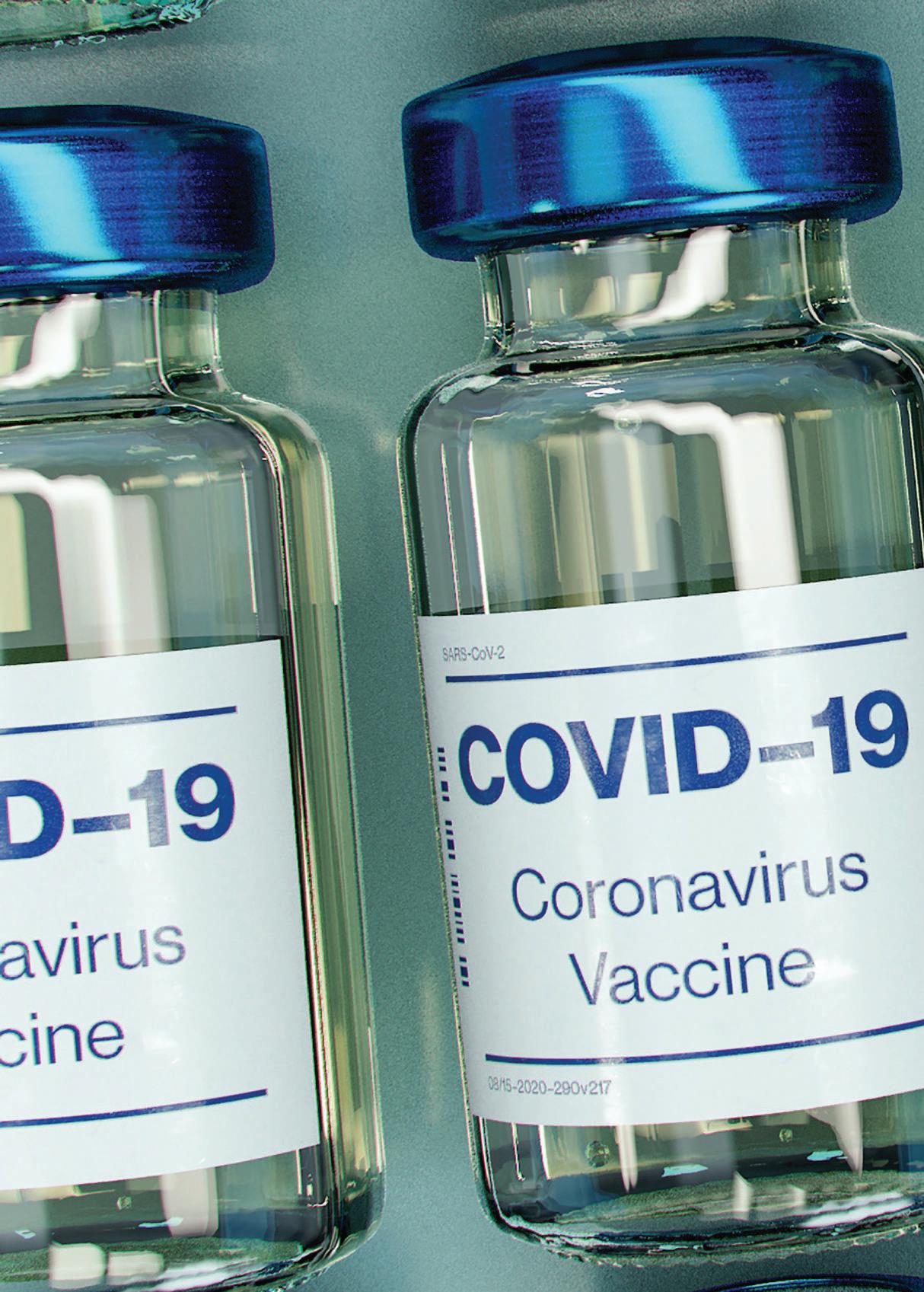
5 minute read
Covid-19 Vaccination Rollout: UK Progress and International Outlook
Dr. Oksana Artyomenko MD FRSM Oksana.Artyomenko@aspen-waite.co.uk
With Covid restrictions now being gradually eased, we all feel like there is finally a light at the end of the tunnel. It is fair to say that the UK vaccine rollout is already an outstanding achievement, which puts us far ahead of many countries in terms of number of people vaccinated.
Advertisement
As of May 7th, 76.7 vaccine doses per 100 people have been given in the UK, with a total of over 51.2 million doses. And there are already promising signs the vaccines are reducing hospital admissions and deaths, as well as community transmission.

Of note, an Oxford-AstraZeneca vaccine remains the most widely used in the world (Figure 1). It therefore has the most real-world data collected from its use, giving additional confidence in its safety and effectiveness profile. Oxford-AstraZeneca
Pfizer-BioNTech
Sinopharm
Moderna
Sputnik V
Sinovac 40
38
32
23
Janssen
CanSino 14
2
EpiVacCorona 1
Covaxin (Bharat Biotech) 1 87 141
0 50 100
Figure 1: Only includes locations where data on doses administered is available Source: Our World in Data, 11.30 BST on 7 May
However, things are not looking the same in the rest of the world. Publicly available data shows that 45% of all vaccine doses administered so far have gone to
Figure 2
just 16% of the world’s population in what the World Bank considers high-income countries. The picture below shows examples of that.
Low-income countries
30,000 Nigeria
Ghana
60,000
90,000 Lower-middle
Tanzania
India Upper-middle
Brazil

Serbia High-income

Canada
Britain Chile
Israel United States
Figure 2. Vaccine doses administered per 100,000 residents. Circles sized by population, vaccine data as of May 6. Countries with population less than 1 million are not shown.
A team at Duke University’s Global Health Innovation Centre recently found that high-income countries locked up 53% of near-term vaccine supply. They estimate that the world’s poorest 92 countries will not be able to reach a vaccination rate of 60 percent of their populations until 2023 or later.
For the world to be back to normal, allowing us to travel freely for work, social and holiday purposes, not one, but all countries need to reach a certain level of Covid-19 immunity. So, what is being done to tackle such existing inequality?
An international effort, known as the Covax scheme, was set up last year to try to ensure fair access to vaccines among rich and poor nations. More than 49 million vaccine doses have been delivered through Covax so far. However there have been issues with its deployment, starting from it not being rolled out quickly enough. Also, initial targets were missed and problems with deliveries are likely to be exacerbated by the deteriorating situation in India. Officials there have restricted exports to protect their own population amid record-breaking number of cases and deaths.
On Friday 7th May, the WHO approved for emergency use a COVID-19 vaccine from China’s state-owned drugmaker Sinopharm, bolstering Beijing’s push for a bigger role in inoculating the world. The vaccine, one of two main Chinese coronavirus vaccines that have been given to hundreds of millions of people in China and elsewhere, is the first developed by a non-Western country to win WHO backing.
It is also the first time the WHO has given emergency use approval to a Chinese vaccine for any infectious disease. Earlier this week, separate WHO experts had expressed concern about the quality of data the company provided on side effects, and additional data has been requested from the manufacturer. This approval allows the vaccine to be included in the COVAX scheme, hopefully adding more doses to countries which need it most.

As some countries do not have enough vaccine doses, many people remain hesitant about getting the shot, and the virus constantly mutating, Covid-19 will stay with us for the foreseeable future.
In such circumstances, a vaccination programme alone is not enough. Drug developers and public health experts say what is needed now is an easyto-take treatment for COVID-19, which could prevent people with symptoms from getting worse and ending up in the hospital – a convenient pill to be used at the first symptoms of the disease. A pharma giant Pfizer is investigating a potential oral therapy that could be prescribed at the first sign of infection, without requiring that patients are hospitalized or in critical care. They are also trialling an intravenous antiviral candidate as a potential novel treatment option for hospitalized patients. If both are successful, “there is a potential to create an end-to-end treatment paradigm that complements vaccination in cases where disease still occurs” – said Mikael Dolsten, MD, PhD., Chief Scientific Officer and President, Worldwide Research, Development and Medical of Pfizer.

The potential pill is a protease inhibitor, which binds to a viral enzyme (called a protease), preventing the virus from replicating in the cell. Protease inhibitors have been effective at treating other viral pathogens such as HIV and hepatitis C virus, both alone and in combination with other antivirals. Currently marketed therapeutics that target viral proteases are not generally associated with toxicity and as such, this class of molecules may potentially provide well-tolerated treatments against COVID-19.
There are ongoing discussions at the WTO regarding the proposal to waive the patents on vaccinations and other Covid-related items, supposedly allowing production of more doses. This proposal was backed by the US last week, however it may not fully address the issue and is raising more concerns related to manufacturing, supply chain and quality. The EU and UK are more in favour of supply chain improvements, creating partnerships leading to voluntary licensing, such as collaborations between the Serum Institute of India and Oxford-AstraZeneca.

Right now, the time to a full resolution of the epidemiological situation worldwide remains unclear. Undoubtedly, there will be further costs to the worldwide economy. While the UK vaccine rollout is expected to contribute to a boost of the UK economy in the near and medium term, and we hope to start moving towards the national recovery, it is important to keep in mind the global outlook and strengthen our international partnerships. The Aspen Waite team is working tirelessly to create new international collaborations. We are confident that our unique position would create significant synergies in healthcare, manufacturing, and other areas in the EU and beyond.

References:
1. https://www.washingtonpost.com/world/ interactive/2021/coronavirus-vaccine-inequalityglobal/ 2. https://www.bbc.co.uk/news/world-56237778 3. https://fortune.com/2021/05/07/covidtreatment-at-home-pills-tamiflu-coronavirus/ 4. https://www.pfizer.com/news/press-release/ press-release-detail/pfizer-initiates-phase-1-studynovel-oral-antiviral 5. https://www.reuters.com/world/middle-east/ who-gives-emergency-approval-sinopharm-firstchinese-covid-19-vaccine-2021-05-07/










